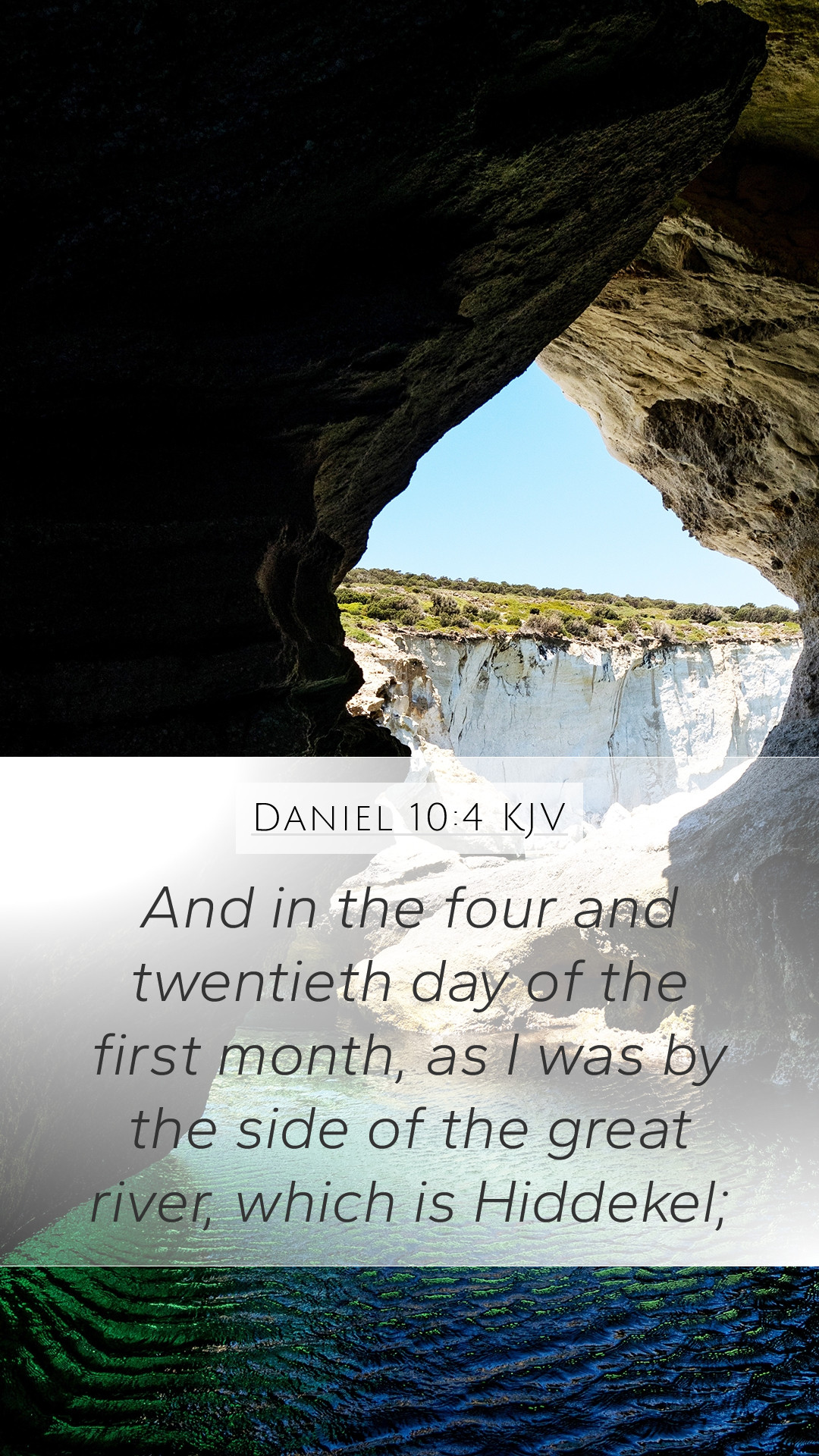Old Testament
Genesis Exodus Leviticus Numbers Deuteronomy Joshua Judges Ruth 1 Samuel 2 Samuel 1 Kings 2 Kings 1 Chronicles 2 Chronicles Ezra Nehemiah Esther Job Psalms Proverbs Ecclesiastes Song of Solomon Isaiah Jeremiah Lamentations Ezekiel Daniel Hosea Joel Amos Obadiah Jonah Micah Nahum Habakkuk Zephaniah Haggai Zechariah MalachiDaniel 10:4 Meaning
What is the meaning of Daniel 10:4?
And in the four and twentieth day of the first month, as I was by the side of the great river, which is Hiddekel;
Daniel 10:4 Bible Verse Meaning
Understanding Daniel 10:4 - A Comprehensive Bible Verse Commentary
Daniel 10:4: "And in the four and twentieth day of the first month, as I was by the side of the great river, which is Hiddekel." This verse marks an important moment in Daniel's prophetic vision, providing significant insight into the themes of prayer, spiritual warfare, and divine revelation.
Summary of Key Themes
- Context of the Vision: Daniel received this vision during the period of the Jewish exile, specifically while he was mourning and fasting for three weeks.
- Historical Significance: The reference to Hiddekel, now known as the Tigris River, places the event geographically during a time of profound spiritual and national concern for the Israelites.
- Spiritual Warfare: This chapter emphasizes the reality of spiritual battles occurring alongside earthly events.
- Divine Revelation: The setting prepares the reader for the revelations that follow, highlighting God’s communication with His people.
In-Depth Analysis of Daniel 10:4
This verse serves as a pivotal point within the broader narrative of the Book of Daniel. It encapsulates the atmosphere surrounding Daniel's prophetic experiences and sets the stage for the subsequent interpretations of visions that God reveals to him. Notably, several public domain commentaries illuminate various aspects of this verse:
Charles Spurgeon on Daniel's Fasting
Spurgeon notes that Daniel's mourning and fasting illustrate the earnestness with which he approached God in prayer. His physical state reflects a spiritual urgency, seeking God’s guidance amidst troubles.
Matthew Henry's Commentary
Matthew Henry comments on the significance of the timing, highlighting the first month of the Jewish calendar, which is crucial for understanding the Jewish feasts and the context of Israel's covenant with God. Daniel's position by the Tigris River indicates a place of contemplation, perhaps symbolizing a junction between the earthly and the divine.
Albert Barnes on the River Hiddekel
Albert Barnes provides insights on the geographical context, stressing that rivers often symbolize life and communication. The mention of Hiddekel, alongside the profound events unfolding, signifies a reminder that God’s presence and wisdom flow freely to those who seek Him.
Adam Clarke's Insight on Timing
Adam Clarke elaborates on the significance of the date mentioned, suggesting it is a time of reflection and directed prayer, leading to divine intervention. This reflects the importance of timing in prayer and how God's responses align with human initiatives in seeking Him.
Application and Significance of Daniel 10:4
For modern readers, this verse offers valuable Bible study insights. Here are some applications:
- Encouragement to Pray: Just as Daniel was earnest in prayer, believers today are encouraged to approach God with sincerity and dependence.
- Understanding Spiritual Realities: The backdrop of spiritual warfare reminds us of the unseen battles that often accompany our spiritual journeys.
- Importance of Context: Understanding the historical and cultural background of scripture enhances our Bible verse interpretations.
Cross References
This verse relates to several other passages that deepen its understanding:
- Ezra 8:21: A moment of fasting and seeking God's guidance.
- Ephesians 6:12: The spiritual warfare theme of opposing forces.
- Matthew 17:21: The importance of prayer and fasting in spiritual battles.
Conclusion
Daniel 10:4 is a profound verse within the landscape of biblical prophecy that invites readers to engage deeply with the text. By considering the components of historical context, spiritual fervor, and God's providential revelations, one gains a clearer understanding of scripture.
By studying this and related verses, believers can cultivate a deeper faith, improve their Bible study skills, and enhance their ability to interpret and apply scripture in their lives.


